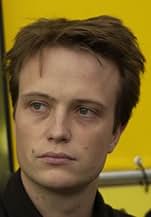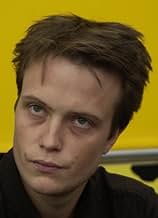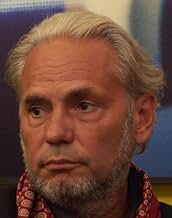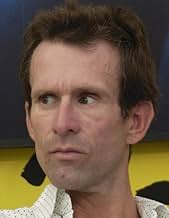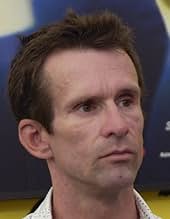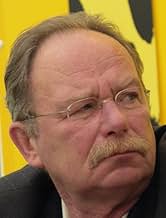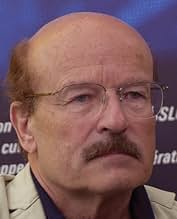PUNTUACIÓN EN IMDb
7,0/10
2 mil
TU PUNTUACIÓN
Añade un argumento en tu idiomaA drama loosely based on Jean Bernard's Nazi-era prison diary.A drama loosely based on Jean Bernard's Nazi-era prison diary.A drama loosely based on Jean Bernard's Nazi-era prison diary.
- Dirección
- Guión
- Reparto principal
- Premios
- 6 premios y 13 nominaciones en total
Vladimír Fiser
- Bischof Kozal
- (as Vladimir Fiser)
Peter Varga
- Józef (Polish Inmate)
- (as Petr Varga)
Reseñas destacadas
It showed just all the considerations that the Vatican and the clergy had to make and how complicated and not black and white their decisions were based upon. Not everything is as obvious as it seems. And it was not a Catholic based excuse movie for decisions made, it was just the facts. And it wasn't just the church that had to make these difficult considerations in WW2, but many governments and institutions. When your dealing with a madman who can like current day Putin, kill tens of and hundreds of thousands of people because of a single slight, you certainly have to be careful in your decisions. Just as the NATO decision on a no fly zone over Ukraine decision is. Sure we want to do it but is it worth starting WW3 over? Decisions I'm certainly glad I'll never have to make.
During WW2 a priest named Henry Kremer(Ulrich Matthes) imprisoned in concentration camp of Dachau is freed along a period of 9 days. He's threatened by a SS Unterstumfuhrer(August Dhiel) to convince the Luxemburg bishop(Tathe) to write a declaration for supporting the Nazi regime . The priest is affected because of his decision whether or not to collaborate with the Nazis.
This is an intelligent and thought-provoking film , correctly based on real events. The director covers a wide variety of plot developments at a rare pace by means of continuous flashbacks in which remembers horrible events at concentration camp of Duchau. Excellent performances by main cast as Ulrich Matthes (Goebbles in ¨The downfall¨) and August Dhiel(Ingorious bastards). Good secondary cast as Bibiana Beglau (Legend of Rita by Schlondorff) as the affecting sister . The musical score is often despairing and screeching with surprising witty touches , it is composed by Russian musician Alfred Schnitke(1934-88). The motion picture is well directed by Volker Scholondorff. He's an expert on Nazi issues as proved in ¨Tim drum¨ , ¨The ogre¨ and this one. Schlondorff does a very unusual pictures with important insight into how the past affects the present and root causes of war. His first feature film, ¨Young Torless¨ was showed around the world and he was pretty heard by international viewers when directed ¨The lost honour of Katharine Blum¨, getting similar success his fellow-countrymen as Fassbinder, Herzog and Wenders. His reputation was greatly enhanced when his phenomenal movie ¨Tin drum¨ was awarded the Oscar as best foreign-language film. Later on,Schlondorff consolidated with ¨Circle of deceits¨. Since then his films have been less satisfactory as ¨Murder in the Bayou¨ , ¨Handmaid's tale¨and ¨Palmetto¨.
Rating : Very good , Schlondorff's one the last impressive film to date. The film is admirable coherent , though in complicated narrative and never sags under its approx. hundred minutes . The movie will appeal to Nazi theme buffs
This is an intelligent and thought-provoking film , correctly based on real events. The director covers a wide variety of plot developments at a rare pace by means of continuous flashbacks in which remembers horrible events at concentration camp of Duchau. Excellent performances by main cast as Ulrich Matthes (Goebbles in ¨The downfall¨) and August Dhiel(Ingorious bastards). Good secondary cast as Bibiana Beglau (Legend of Rita by Schlondorff) as the affecting sister . The musical score is often despairing and screeching with surprising witty touches , it is composed by Russian musician Alfred Schnitke(1934-88). The motion picture is well directed by Volker Scholondorff. He's an expert on Nazi issues as proved in ¨Tim drum¨ , ¨The ogre¨ and this one. Schlondorff does a very unusual pictures with important insight into how the past affects the present and root causes of war. His first feature film, ¨Young Torless¨ was showed around the world and he was pretty heard by international viewers when directed ¨The lost honour of Katharine Blum¨, getting similar success his fellow-countrymen as Fassbinder, Herzog and Wenders. His reputation was greatly enhanced when his phenomenal movie ¨Tin drum¨ was awarded the Oscar as best foreign-language film. Later on,Schlondorff consolidated with ¨Circle of deceits¨. Since then his films have been less satisfactory as ¨Murder in the Bayou¨ , ¨Handmaid's tale¨and ¨Palmetto¨.
Rating : Very good , Schlondorff's one the last impressive film to date. The film is admirable coherent , though in complicated narrative and never sags under its approx. hundred minutes . The movie will appeal to Nazi theme buffs
In World War II, after a period living hell on earth in the concentration camp of Dachau with other catholic priests, Father Abbé Henri Kremer (Ulrich Matthes) gets a nine days leave to return to his home town for his mother's funeral. Along this period, the SS Gestapo lieutenant Gebhardt (August Diehl) tries to persuade Henri, who was born in silver-spoon and member of an influent Luxembourgian family, to convince the local bishop to give-up resisting to the Germans and write a letter to the Vatican in the name of the Catholic Church of Luxemburg convincing the Pope to support Hitler and the Nazi regime. The ambivalent Henri questions himself and the bishop what he shall do.
Based on a true story, "Der Neunte Tag" is an awesome movie and another impressive example of the powerful German cinema, of which I am a great fan. The philosophical duel between the characters of Ulrich Matthes and August Diehl is simply fantastic, with magnificent silence and dialogs. Sometimes, silence associated to the expression of the face is more significant than words. The direction is stunning and very realistic, particularly in the concentration camp; the music score and the cinematography are very beautiful; and the performances are perfect, with the two lead actors deserving nominations to the Oscar. My vote is nine.
Title (Brazil): "9o Dia" ("9th Day")
Based on a true story, "Der Neunte Tag" is an awesome movie and another impressive example of the powerful German cinema, of which I am a great fan. The philosophical duel between the characters of Ulrich Matthes and August Diehl is simply fantastic, with magnificent silence and dialogs. Sometimes, silence associated to the expression of the face is more significant than words. The direction is stunning and very realistic, particularly in the concentration camp; the music score and the cinematography are very beautiful; and the performances are perfect, with the two lead actors deserving nominations to the Oscar. My vote is nine.
Title (Brazil): "9o Dia" ("9th Day")
10golomi
After reading some of the reviews below, I could not resist the frustration and decided to register and express my own opinion on the subject. First of all, it is a great movie, very humanistic and powerful. It is a movie about inner human struggle, it has nothing to do with church propaganda or any other nonsense so cheaply expressed by some "commentators". Being myself raised and atheist (in the former Soviet Union), subsequently going through Christian transformation but eventually abandoning it and becoming a naturalistic pantheist, I found the movie extremely resonating and devoid of any propaganda at all. It is a story about life the way it was, about people cast into the horror of the state machine, powerless and nearly broken. You will see no heroics, no pretty faces, no romantic interludes, only the bleak atmosphere and a masterful portrayal of the events. The most persistent feeling the movie leaves inside is the torturous question "What character could I actually be had I lived back then?" and the chilling realization of the answer "anyone of them." I only hope that the History is not going to repeat itself the way it always persistently did over the past millennium.
Most people are "conditioned" with the false sense of Hollywood "reality" in movies, but the real life is very different and this movie provides a great example of it. It actually is a big plus that the language is German, it adds a lot to the authenticity of the feeling. I have no difficulties following the English subtitles, the dialogs are sparse and do not divert from the main flow (needless to say, my native language is Russian). Finally, the soundtrack is simply incredible. The morons who call it "weak" should check the credits at the end the bulk of the sound uses Alfred Schnittke's symphonic works a perfect ornament to the gloomy and hopeless flow.
If you are looking for a movie to entertain yourself, you are definitely in a wrong place. By if you are like me, looking for a movie to enhance your soul and understanding of the drama of our life, then it is definitely worth checking out. 10/10
Most people are "conditioned" with the false sense of Hollywood "reality" in movies, but the real life is very different and this movie provides a great example of it. It actually is a big plus that the language is German, it adds a lot to the authenticity of the feeling. I have no difficulties following the English subtitles, the dialogs are sparse and do not divert from the main flow (needless to say, my native language is Russian). Finally, the soundtrack is simply incredible. The morons who call it "weak" should check the credits at the end the bulk of the sound uses Alfred Schnittke's symphonic works a perfect ornament to the gloomy and hopeless flow.
If you are looking for a movie to entertain yourself, you are definitely in a wrong place. By if you are like me, looking for a movie to enhance your soul and understanding of the drama of our life, then it is definitely worth checking out. 10/10
The basic idea of this film is rather interesting. There was a catholic priest from Luxembourg imprisoned in the concentration camp Dachau during the Second Word War. He wrote a diary describing daily camp life. But for 9 days he is allowed to get back to his family for the funeral of his mother. It is known that he is interrogated by the GESTAPO. But he does not tell anything about it in his diary. So the film fills the historic gap with some fiction. We are told the story of a young Nazi official who tries to convince the priest to get his bishop to stop his passive resistance. So far so good. Quite conceivable that this actually happened. But. The whole thing is just not believable. The dialogs are weak, so far as there are dialogs at all. Most of the time Uli Matthes, who is supposedly one of the best German actors, is silent. You just see his face with an expression that you can put anything into. That of course is impressive. But it is not acting. We are told that he is brilliant, but it is never shown. He just has switched uniforms. He recently played Goebbels in the Downfall. What I had expected was some real intellectual argument between the Nazi guy and a catholic intellectual. There is next to nothing of it. Some argument about Judas but it is never clear what this is supposed to proof. There is never a moment of doubt about the outcome of the "intellectual battle". And because of this the film is a failure. Very good music, though and some good scenes of the concentration camp life.
¿Sabías que...?
- PifiasWhile their fellow-prisoner is being crucified, the priests are singing the hymn "Pange, lingua, gloriosi" by Thomas Aquinas (1264). However, they are singing a German version of this song, which was not in use before 1969. In addition, even if they happened to know a German version, it would be more likely for them to sing the original Latin version, as there were priests from all over Europe imprisoned in this block.
- ConexionesReferenced in Di que sí (2008)
- Banda sonoraConcerto Grosso No. 1
Music by Alfred Schnittke
Selecciones populares
Inicia sesión para calificar y añadir a tu lista para recibir recomendaciones personalizadas
- How long is The Ninth Day?Con tecnología de Alexa
Detalles
- Fecha de lanzamiento
- Países de origen
- Sitio oficial
- Idiomas
- Títulos en diferentes países
- The Ninth Day
- Localizaciones del rodaje
- Empresas productoras
- Ver más compañías en los créditos en IMDbPro
Taquilla
- Recaudación en Estados Unidos y Canadá
- 72.888 US$
- Fin de semana de estreno en EE. UU. y Canadá
- 8786 US$
- 29 may 2005
- Recaudación en todo el mundo
- 135.311 US$
- Duración
- 1h 38min(98 min)
- Mezcla de sonido
- Relación de aspecto
- 1.85 : 1
Contribuir a esta página
Sugerir un cambio o añadir el contenido que falta

